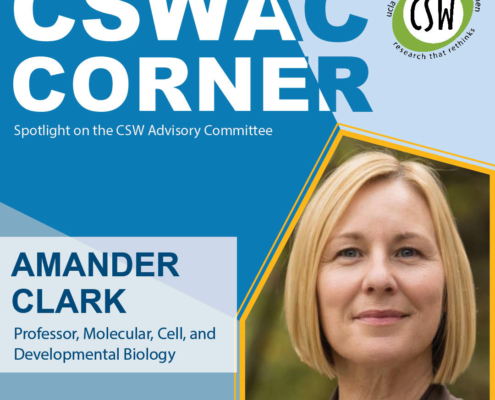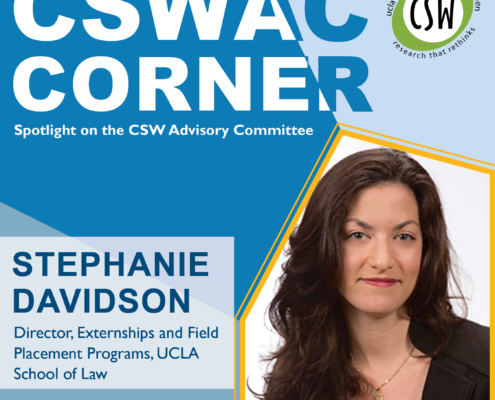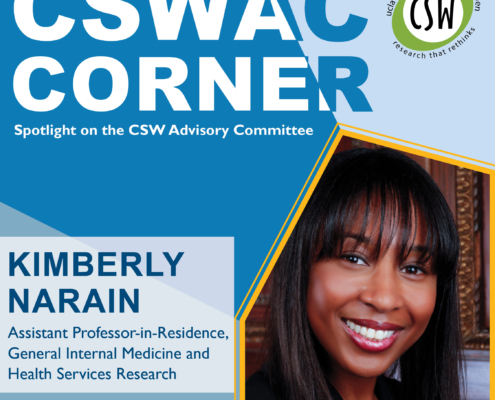CSWAC Corner: Nina Eidsheim
Get to know our CSW Advisory Committee (CSWAC) members through CSWAC Corner! We are proud to have an advisory committee made up of feminist scholars working in various fields from gender studies to public health to film and television.
Nina Eidsheim is professor of musicology at the UCLA Herb Alpert School of Music and founder and director of the UCLA Practice-based Experimental Epistemology (PEER) Lab, an experimental research Lab dedicated to decolonializing data, methodology, and analysis, in and through multisensory creative practices.
What does your current work consist of?
Besides teaching and service to the department, UCLA, the community and a number of national arts organizations, I am engaged in multiple collaborative projects. Most of them arose as part of the work of the Practice-based Experimental Epistemology Research (PEER) Lab, which I founded in 2020. These projects range in size and scope, but all seek to bring to the surface marginalized stories, voices, epistemologies and perspectives.
What are you recently proud of/excited about in your career?
I am proud of a collaboration with my UCLA colleague professor Michelle Caswell (Information Studies) and the 45-year-old Los Angeles-based arts and activist organization Great Leap. Together we considered the issue of community-based arts archiving and questions around local and national access and belonging. Small arts organizations are often resource-strapped, spending what limited resources they do have on urgent political work and activism in response to immediate situations. It can often be challenging for them to take the time to think carefully about issues such as archiving. This lack of time-resources for introspection typically renders the stories of community-based and community-serving organizations un-stewarded.
Caswell and I secured a grant that allowed Great Leap to be compensated for the time we spent talking with them about their vision for their archive, some of which were seemingly incompatible with each other. Based on interviews with past and present key stakeholders, we were able to design a modular archival model that combined physical and digital iterations. This will allow the materials to be included in a national archive, but also to be available locally. It will also allow users multiple access points to the collection. Together with Great Leap, we created a scalable and modular blueprint that arts organizations can adapt for their own community archive processes.
Where can we find you on social media?
@peerLabUCLA on Instagram
What are some of your current reads or a podcast that you’ve been listening to lately?
I’m reading Katharina Pistor’s The Code of Capital: How the Law Creates Wealth and Inequality (2020). Her mapping of how legal codes, with support from federal and local law enforcement and court systems, enable some to create personal economic vehicles and wealth—say, by using land, minerals, water—is widely relevant. Pistor doesn’t write about music (as far as I know), but to me there is a deep parallel between the issues she addresses and the musical realm. Music is, of course, energy transduced through material. Much of my work is concerned with how a group of people makes meaning with this energy and, related to Pistor’s work, how that group claims ownership—which is then protected by the legal system.
Who is someone you find inspiring in your field of research?
I am currently working on a book about composer, trumpeter, and music philosopher Wadada Leo Smith. His invention of Ankhrasmation—a relational musical language (in comparison to a system that is based on a fixed grid, like Western classical notation)—has been hugely inspiring to me. Born in Leland, Mississippi, in the same year as Emmett Till, Smith grew up facing tremendous danger and severe limitations. He followed the great migration to Chicago, becoming a highly influential bandleader and founding member of the Association for the Advancement of Creative Musicians (AACM). His continuing to compose and tour at 81 is hugely inspiring to me.
What is a piece of advice that you’d recommend to others starting out in your field of interest?
In training as scholars, we acquire skills and perspectives that can be utilized in many different types of spaces. To me, it is hugely motivational that, if called on, I have a toolbox—critical thinking, writing, teaching, sharing, organizing—which I can use in nearly any potential profession or endeavor. Also, join or start a writing group!
If you are a CSW Advisory Committee member who would like to be featured in CSWAC Corner, please fill out this Google form.




